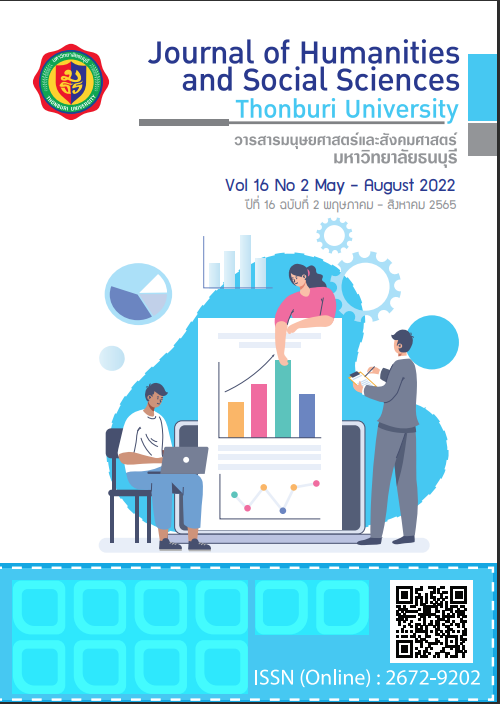Willingness to Pay for Children's Education in Digital era: Bangkok and Vicinity
Keywords:
Willingness to pay, Education, Digital era, COVID-19Abstract
The impact of the COVID-2019 pandemic has acted as a catalyst for the leap in technology, creating a turnaround in all told sectors as a result of the social distancing measures implemented by the Thai government and other countries to prevent the spread of the virus. The education sector has been directly affected by the adaptations of academic institutes. This article aims to use digital media to help children learn and assess the value of their parents’ willingness to pay for education in the digital era through a survey on learning. It can be concluded that learning in the normal style and online are both appropriate, with 83.65% of survey participants being willing to adapt in the future if everything is done online, while 89.42% were in favour of online learning provided it did not place too large a burden on parents, and 66.35% expressed concern that it may cause income loss. The estimated average cost of the internet for children's education in the digital era is 709.66 baht per month, and the average cost of learning equipment is 25,741.08 baht. For the benefit of application, knowledge on the use of digital media should be given to both parents and children. Developing learning and giving advice to children is essential to help build understanding and motivate parent-child interactions. Technology can also be adapted to better suit the lifestyles of people in the city and community more.
References
กัลยา วานิชยบัญชา. (2549). สถิติสำหรับงานวิจัย. พิมพ์ครั้งที่ 2. กรุงเทพฯ: โรงพิมพ์แห่งจุฬาลงกรณ์มหาวิทยาลัย.
คมสัน สุริยะ.(2552). แบบจำลองโลจิค: ทฤษฎีและการประยุกต์ใช้ในการวิจัยทางเศรษฐศาสตร์. คณะเศรษฐศาสตร์ มหาวิทยาลัยเชียงใหม่.
เฉลิมชัย เลี้ยงสกุล. (2563). การศึกษาในยุค COVID-19. กรุงเทพฯ: วิทยาลัยเสนาธิการทหาร.
พงศ์ทัศ วนิชานันท์. (2563). การศึกษาพื้นฐานในยุค โควิด-19: จะเปิด-ปิดโรงเรียนอย่างไร. สืบค้นเมื่อ 10 ตุลาคม 2564, จากhttps://tdri.or.th/2020/05/basic-education-in-covid-19-crisis-reopening-school-after-lockdown
ภาวรรณ ธนาเลิศสมบูรณ์. (2563). ปิดโรงเรียนเปลี่ยนอนาคต:โลกการศึกษาหลังเผชิญไวรัส COVID-19. สืบค้นเมื่อ 10 ตุลาคม 2564, จาก https://www.the101.world/covid19-school-closure
ภูษิมา ภิญโญสินวัฒน์. (2563). จัดการเรียนการสอนอย่างไรในสถานการณ์โควิด-19: จากบทเรียน ต่างประเทศสู่การ จัดการเรียนรู้ของไทย. สืบค้นเมื่อ 10 ตุลาคม 2564, https://tdri.or.th/2020/05/examples-of-teaching-and- learning-in-covid-19-pandemic
สมเดช บุญประจักษ์. (2551). สถิติเพื่อการวิจัย. กรุงเทพฯ: โรงพิมพ์พิทักษ์การพิมพ์.
อุดมศักดิ์ ศีลประชาวงศ์. (2556). การประเมินมูลค่าทางเศรษฐศาสตร์ของทรัพยากรสิ่งแวดล้อม=Economic valuation of environmental resources. กรุงเทพฯ: สำนักงานกองทุนสนับสนุนการวิจัย.
Cahapay, M. B. (2020). Rethinking education in the new normal post-COVID-19 era: A curriculum studies perspective. Aquademia: 4(2). ep20018.
Intharawiset, T., Jareoan-sa, T., & Yuang-so̜i, P. (2021). Reflection on Thai Education after COVID 2019. Journal of Legal Entity Management and Local Innovation. 7(4): 323-333.
Langworthy, M.; & Neufeld, P. (2017). Fresno Unified, the Futures Challenge, and 21C Learning Design. Retrieved October 10, 2021, from https://edudownloads.azureedge.net/msdownloads/Fresno_ PLI_Analytics_Report_Year_1_2017.pdf
World Bank EdTech team. (2020). DIGITAL TECHNOLOGIES IN EDUCATION.UNDERSTANDING POVERTY Retrieved October 10, 2021, from https://www.worldbank.org/en/topic/edutech#1.
Yamane, T. (1967). Statistics: An introductory analysis (No. HA29 Y2 1967).
Translated Thai References
Boonprajak, S. (2008). Statistics for Research. Bangkok: Phithak Printing Press. (in Thai)
Leangsakul, C. (2020). Education in COVID-19 era. Bangkok: Joint War College (in Thai)
Pinyosinwat, P. (2020). How to organize teaching and learning in the situation of COVID-19: from foreign lessons to teaching Management of Thai education. Retrieved October 10 2021, from https://tdri.or.th/2020/ 05/examples-of-teaching-and- learning-in-covid-19-pandemic (in Thai)
Silprachawong, U. (2013). Economic valuation of environmental resources. Bangkok: The Thailand Research Fund. (in Thai)
Suriya, K. (2009). Logit Model: Theory and Applications of Economics. Faculty of Economics, Chiang Mai University. (in Thai)
Thanalerdsomboon, P. (2020). School closures change the future: The world of education after facing the COVID-19 situation. Retrieved October 10 2021, from https://www.the101.world/covid19-school-closure (in Thai)
Vanichanan, P. (2020). Compulsory education in Covid-19 era: how to open and close. Retrieved October 10 2021, from https://tdri.or.th/2020/05/basic-education-in-covid-19-crisis-reopening-school-after-lockdown/. (in Thai)
Vanichbuncha, K. (2006). Statistics for research. 2nded. Bangkok: Chulalongkorn University Printing House. (in Thai)
Downloads
Published
How to Cite
Issue
Section
License
Copyright (c) 2022 Saranchana Kaewbuadee, Asst.Prof.Dr.Tanpat Kraiwanit

This work is licensed under a Creative Commons Attribution-NonCommercial-NoDerivatives 4.0 International License.
ผลงานที่ปรากฎในวารสารฉบับนี้เป็นลิขสิทธิ์เฉพาะส่วนบุคคลของผู้เขียนซึ่งต้องรับผิดชอบต่อผลทาง กฎหมายที่อาจเกิดขึ้นได้และไม่มีผลต่อกองบรรณาธิการ






